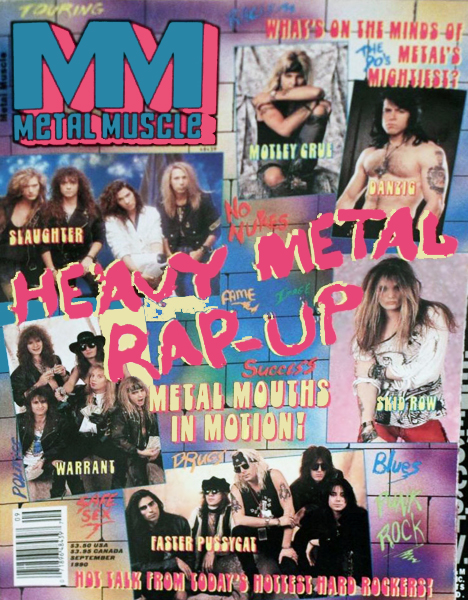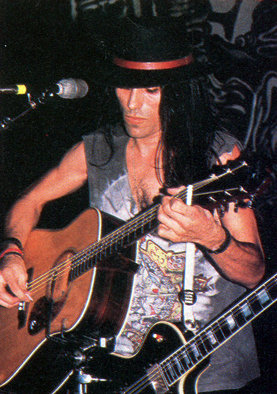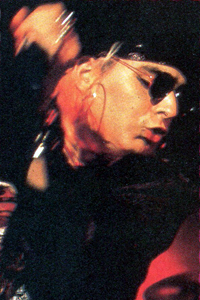
| Search JoyZine with Google Site Search! |
interview by Joy Williams
L.A.'s Faster Pussycat has come in for a lot of criticism for being a glam band and an "Aerosmith rip off." Not surprisingly, they've had a lot of trouble gaining respect. The feeling is that if you use makeup and dye your hair and wear glitzy clothes and a lot of scarves, you're just putting on an image so that nobody will notice that you really can't play. In talking to guitarist Bent Muscat, though, we discovered that the image thing really grows out of the kind of people these guys are, and it's just not a made-up device at all. Although it's long been a part of rock'n'roll, but especially since the advent of MTV, a band's image is very important—to the point that some fans won't accept a change in look any more easily than they'll accept a change in their favorite band's musical style. The musicians themselves, though, don't really accept that restriction. As Brent puts it, "We're going to change on every album, both the music and our look. That's the way we are, and that's the way we want to do it. We don't really think about it, we just change. My first year of high school I had a mohawk. The second year I had blond spiky hair. The third year I remember having a bald head." I remember sitting in Faster Pussycat's dressing room a couple of years ago, with all the boys dressed to the teeth and in full makeup with a bunch of underclad metalloid-type girls hanging about, and Greg's totally normal-looking, suburbanite family walking in. I couldn't help but wonder, "What's going through their minds?" As Brent sees it, it's no big deal. "I mean, it comes around all the time. My dad was a greaser with a leather jacket in the '50s. There's a picture of him in high school and he's got a leather jacket on, and he's got his hair, like, all slicked back and he's got his jeans rolled up. He was cool lookin'. In this other picture he was out on the field and the wind's blowin' and there's 20 girls in their dresses, like, the dresses they wore in the '50s, you know, with the little poodle on the skirt. But I've changed since I was in high school. There was a period where I had purple hair."
But why? Just to be rebellious? Brent thinks there's more to it than that. "You go through changes to find out who you are. I've gone through so many changes and phases and been into so much weird stuff. Some of the stuff I did in high school is still with me." And he doesn't really worry about what other people think. "Well," he commiserates, "of course I want people to like me, I want people to like my music. But you know what? Everybody's not going to. As far as look wise, I'll do something and I don't care what people think. Well, I guess I care a little bit, but..." Even so, not caring about what "everyone's going to say" doesn't make it any easier to get up on stage in front of them and leave yourself open to maybe being hated or despised. Even though he started playing trumpet and being in school plays when he was in the fifth grade, he admits to still being "scared shitless to do it, just like everybody is. You freeze up and you go through the butterflies [in the stomach]. But, at the same time, there's something else you get out of it. Believe me, I've been on the stage with Faster Pussycat probably over 200 times, and the butterflies—I still get them." Of course, there's more to Faster Pussycat than their image. With "House of Pain" at press time at #29 with a bullet on the Billboard charts, you can't deny something is happening musically. Q: So many different things go into a song and all these different pieces have to fit together. It's more than a jigsaw puzzle; it's layers and interlocking, intertwined patterns of sounds, and that's not even getting into the lyrics. When you're writing a song, how do you deal with that? BRENT: There's two guitar players and a bass player. When me and Greg play, we always try to do something different. He does one thing and I'll do something higher. With a lot of the the stuff, he'll start playing something and it's almost second nature, you know, our parts. We play off each other and try not to play the same thing at the same time. Q: It's probably a combination of both your individual styles and knowing each other. BRENT: Yeah, exactly. A lot of our favorite bands were the same way. Aerosmith has two guitar players that play off each other. With the Rolling Stones, another one of our favorite bands, Keith Richards a lot of times plays off Ron Wood. I think it's an R&B and funk thing more than a blues thing. I mean, you hear funk and there's all kinds of different textures. Q: Isn't it a lot harder to work it out with someone else, rather than when you're the only guitarist? I've seen bands who have two guitarists, and they stomp all over each other. BRENT: Well, that's all about growing up and growing as musicians. A lot of time you want to play, but sometimes I'll sit back and not play anything—whatever the song calls for. When Greg goes to do a solo, I hold down the rhythm of the song. Q: Do you ever fight over who's going to do the solo? BRENT: Not usually. If he writes the song, he has an idea on what he wants to do. A lot of time, we'll both play it. Like, on a lot of songs on the album he'll play a solo and I'll play a solo. And people who know the band can totally hear it, like, "Here comes Greg and now here comes Brent."
Q: Guitar players have very individual styles, which is probably one reason synthesizers aren't the same. You can make the same notes, but you lose that feeling. What makes the feeling? BRENT: It comes in the groove. I think the most important thing in music is the groove, finding the groove and just getting in there. And when the drums and the bass and the guitars are clicking together, it's magic. You know, you get in the room and you look at each other and just go (singing), "Boom, boom, boom, di, di, di, di." It makes you want to move your body. And that's the magic. Take Led Zeppelin—if you listen to it, it kind of seems complicated, but when you really study it it's, like, in some of the songs, it's the same groove all the way through. There's all types of tricks in music. Like on "Little Dove," that has a groove and there's holes in it—you create holes and one guitar player doesn't play. It pulls the listener into it, and when you lay off on the backbeat, when you're playing on something you only come in on the upbeat. It gives, like, a jumpy feel. Or if you're playing like a fraction behind the beat, it gives a little pulling feeling. Everybody who listens to our record, they feel it but they never think about it. For us, it usually just happens. If we don't practice for a long time, the grooves will come and go, even in a song. You'll capture it for a while then it won't be there—it'll just sound like everybody's playing. There's momentum and rhythm to everything you do in life. If you're doing something, if you're doing it constantly, there's a rhythm. Everything's got a rhythm. Q: Different kinds of music make us feel differently, and I think that has something to do with the music you like. I like to feel up and excited; I like fast, grungy, sleazy, heavy, loud, emotionally moving music. Other people are threatened by those feelings, so they're not going to like your music no matter how good it is. BRENT: I think if you can make one person so excited and the next person threatened, you're accomplishing something. Q: As a musician, what do you feel makes a good song? BRENT: What makes a good song, to me, is a few things. First of all, the music's got to be there; if the music's good and moves someone, that's good. If the lyrics say something, or if they make you feel a certain way, I think it's good. If someone hums it afterwards, I think there's definitely something to it, even songs, sometimes, I can't stand. I'll watch MTV and there'll be some song on there I hate, and then afterwards I'll hum it—there's something there. But it's kind of a matter of taste, you know? Even down at the record company, one guy will not like a song at all, and the next person, it'll be their favorite. Q: Isn't that awfully confusing to you? BRENT: Yeah! It's weird. Sometimes I think maybe because it's different from the last album, too. People get used to the last album and if you change, I think sometimes people freak out on that little bit. There are a few songs on this album that tie into the last album. I think "Slip of the Tongue" and "Tattoo" tie in with the last album. And some people love that stuff. "Poison Ivy" is kind of a happy medium between this album and the old album. But then there's new stuff that's real heavy. A lot of people like "House of Pain" a lot. You know, "House of Pain" is about Taime growing up without his dad being around. That really hits home to a lot of people. Personally, I like "Please, Dear," which is the more Stonesy ballad, it's got the bluesier feel, and it's about Lisa, an old girlfriend of Taime's that got killed in a car accident. Q: But even with the difference in individual tastes about certain styles or certain songs, music really is the universal language. BRENT: Exactly! It is. That's what's neat about it. Music is something everybody can understand, it says something to them—whether they love it or hate it. |


